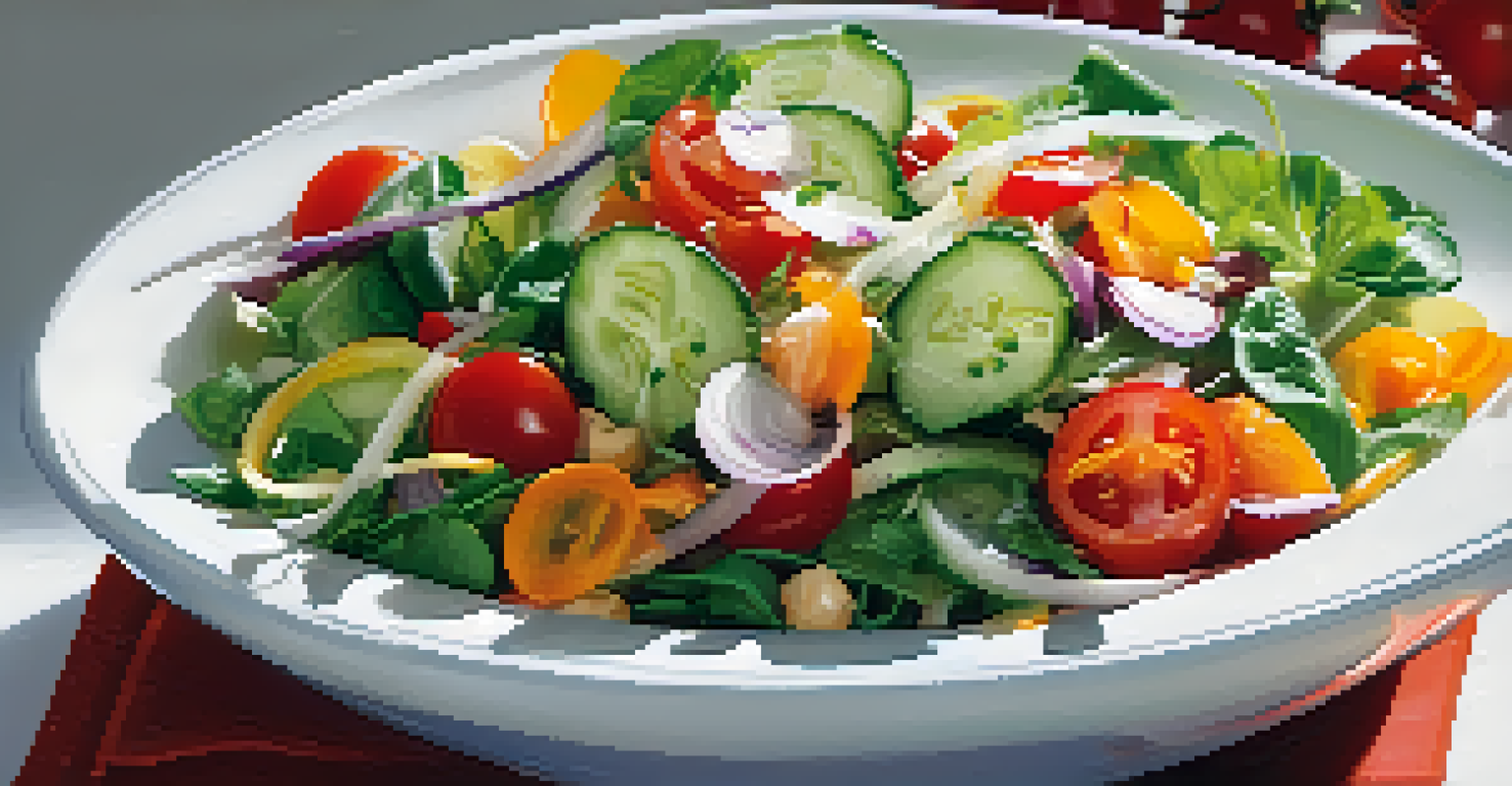Benefits of Raw Vegetables on Gut Flora and Health

Raw Vegetables: A Natural Source of Fiber
Raw vegetables are packed with dietary fiber, which is essential for a healthy digestive system. Fiber acts like a sponge, soaking up water and adding bulk to your stool, making it easier to pass. When you consume raw veggies, you’re providing your gut with the tools it needs to function optimally.
Let food be thy medicine and medicine be thy food.
Moreover, fiber promotes the growth of beneficial gut bacteria, which is crucial for maintaining a balanced gut flora. Think of your gut bacteria as a thriving city; the more diverse and abundant they are, the healthier the entire system becomes. Raw vegetables serve as the perfect food source for these beneficial microbes, fueling their growth.
Incorporating a variety of raw vegetables into your diet can help ensure that you're getting both soluble and insoluble fiber. This balance not only aids digestion but also contributes to overall gut health, making raw veggies a must-have in your daily meals.
Boosting Nutrient Intake with Raw Vegetables
Raw vegetables are a powerhouse of vitamins and minerals, many of which can be diminished through cooking. For instance, vitamin C and several B vitamins are sensitive to heat, so consuming these veggies raw ensures you’re maximizing your nutrient intake. This can significantly benefit your overall health and wellness.

By eating raw, you’re also preserving the natural enzymes found in vegetables. These enzymes are vital for digestion and can help your body break down food more efficiently. Imagine these enzymes as little workers in your gut, tirelessly helping to digest what you eat.
Raw Veggies Aid Digestive Health
Incorporating raw vegetables into your diet provides essential dietary fiber, supporting digestion and gut health.
In addition, the vibrant colors of raw vegetables, such as bell peppers and carrots, indicate the presence of antioxidants. These compounds help combat oxidative stress in the body, potentially reducing the risk of chronic diseases while promoting a healthier gut environment.
Enhancing Gut Flora Diversity with Raw Veggies
A diverse gut flora is key to a healthy digestive system, and raw vegetables play an important role in achieving this diversity. Different vegetables provide different types of fibers and nutrients that cater to various strains of gut bacteria. Eating a colorful array of raw veggies can help you cultivate this essential diversity.
You are what you eat, so don’t be fast, cheap, easy, or fake.
For example, cruciferous vegetables like broccoli and kale offer unique compounds called glucosinolates, which can encourage the growth of specific beneficial bacteria. This is akin to planting different species in a garden; each contributes its own benefits to the ecosystem.
Moreover, the prebiotic fibers found in raw vegetables help to sustain the good bacteria already present in your gut. By feeding these friendly microbes, you’re not only supporting their growth but also enhancing their ability to outcompete harmful bacteria, thereby promoting a healthier digestive tract.
The Role of Raw Vegetables in Reducing Inflammation
Chronic inflammation can wreak havoc on your gut health, leading to a host of issues like bloating and discomfort. Raw vegetables are known for their anti-inflammatory properties, thanks to their rich array of phytonutrients and antioxidants. Including them in your diet can be a simple yet effective way to combat inflammation.
For example, vegetables like spinach and kale are loaded with antioxidants like quercetin, which can help reduce inflammatory responses in the body. Think of these antioxidants as your personal bodyguards, protecting your gut from harmful invaders.
Nutrient Preservation in Raw Foods
Eating raw vegetables maximizes your intake of vitamins and enzymes that can be lost during cooking.
In addition to their direct anti-inflammatory effects, raw vegetables also promote a healthy gut environment by supporting the growth of beneficial bacteria. This balance can further contribute to reducing inflammation, creating a virtuous cycle of gut health and overall wellness.
Improving Hydration Through Raw Vegetables
Staying hydrated is crucial for digestive health, and raw vegetables can be an excellent source of hydration. Many vegetables, like cucumbers and celery, have high water content, which can help keep your body hydrated. Adequate hydration is essential for maintaining healthy gut flora and efficient digestion.
When you consume raw vegetables, you're not just eating nutrients; you're also replenishing your body's water supply. This is especially important in warmer months or after physical activity when your hydration needs are elevated.
Additionally, proper hydration supports the mucosal lining of the intestines, allowing for better nutrient absorption and smoother digestion. So, by incorporating raw veggies into your meals, you're playing a vital role in keeping your gut happy and hydrated.
Supporting Weight Management with Raw Vegetables
Raw vegetables can be a valuable ally in your weight management journey. They are low in calories yet high in fiber and water, which can help you feel full without overloading on calories. This makes them a fantastic option for snacking or as a base for meals, allowing you to enjoy larger portions without the guilt.
Furthermore, the act of chewing raw vegetables requires more effort than processed snacks, which can lead to greater satiety. Think of it as a workout for your jaw; the more effort you put in, the more satisfied you feel afterward.
Hydration and Weight Management Boost
Raw vegetables help with hydration and can assist in weight management by promoting fullness with low calories.
Incorporating raw vegetables into your meals can also help curb cravings for unhealthy options. When you're filling up on nutritious, fiber-rich foods, you're less likely to reach for sugary or processed snacks, supporting your overall health and wellness.
Creating a Balanced Diet with Raw Vegetables
Incorporating raw vegetables into your diet is a fantastic way to achieve a balanced and nutritious eating plan. They can easily complement a variety of dishes, from salads to smoothies, enhancing both flavor and health benefits. The key is to get creative and experiment with different combinations to keep your meals exciting.
For instance, adding fresh spinach to your smoothie can boost its nutrient profile without altering the taste. This is a great way to sneak in more greens, especially for those who might be hesitant about eating vegetables on their own.

Moreover, a balanced diet that includes raw vegetables can promote overall health and well-being. By focusing on whole, unprocessed foods, you’re not only nourishing your gut but also setting the foundation for a healthier lifestyle.